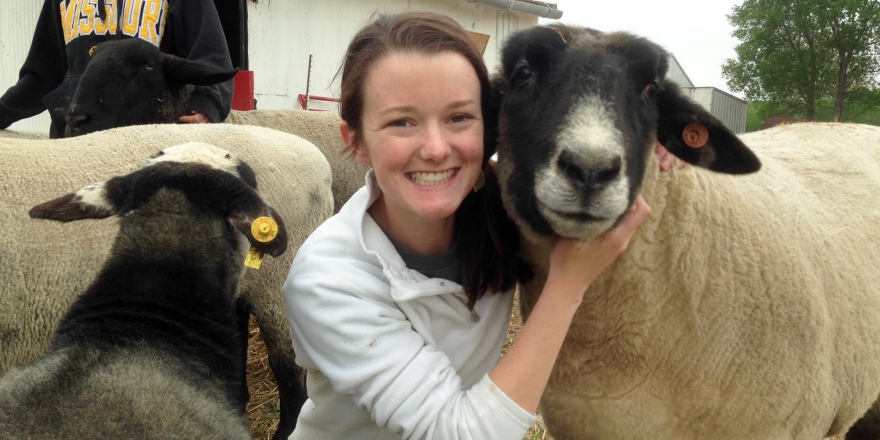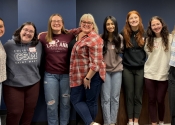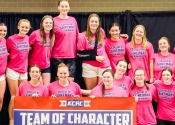
Papillion native’s love of animals goes above and beyond call of duty
Omaha World-Herald, June 27, 2016
By Matthew Hansen / World-Herald columnist
You say you like animals, and I’m sure you do. I’m sure you play fetch with the dog and scratch the cat under the chin and attempt to keep the family hamster alive even though no one really likes that jerk.
So you like animals, but trust me: You do not like animals like Haden Mikesell likes animals.
The 22-year-old Papillion native and recent graduate of the College of St. Mary dotes on pets, but she also did the following things during her college career:
She raised thousands of dollars to save a beloved bovine from getting turned into sirloin. She helped put a beloved sheep to sleep.
She helped a bird relearn how to fly, and put an IV in the jugular vein of a pit bull, and she also pretty much single-handedly changed her college’s policy on doing research that harms animals.
She has done all that before going to veterinary school — she got accepted into the combo University of Nebraska-Iowa State vet program.
So, yeah, Haden likes animals a little more than you do.
“I don’t really know why,” she says of her love for beasts. “I just kind of had a respect for their lives, I guess. And I realized at some point that animals are a lot more, can do a lot more, than be a pet.”
The first time that Haden’s College of St. Mary professors realized just how much she loves animals came when her zoology professor brought in starfish to study. When the class period ended, the professor left the starfish in the classroom.
“What are you going to do with these starfish?” Haden asked. Nothing, the professor replied, these are ... starfish.
“Can I take one home, then?” Haden asked. Can I take one home and try to save it? And she did.
Haden went further a couple of years later in biochemistry lab, when she learned that a specimen for a lab procedure involved killing rabbits. She’s generally against killing rabbits, but she could stand it if it were for, say, a cancer study.
But this was a simple educational procedure that could be done many different ways, Haden learned when she went home and studied it. The other ways do not involve the deaths of rabbits. She questioned the professor about this. She questioned the administration. And now the College of St. Mary is working on ways to teach this procedure in ways that don’t harm animals when possible.
Haden puts her money — or, more accurately, her time — where her mouth is. She spent one summer interning at the Henry Doorly Zoo & Aquarium, where she assisted in the rehab of Skittles, a macaw with a busted wing. She watched as the zookeeper rehabbed the bird, encouraged it when the rehab got tough, taught it over and over again how to extend its wings. She watched Skittles’ transformation, was stunned by it, and thought: This is amazing. This is what I want to do with my life.
She got a job at True Buddy Farms, a therapy farm in Papillion where kids with special needs learn how to care for, and love, their adopted sheep. While she was there, a calf was born on the farm. The calf’s mother died during the birth. The farm employees named the calf Bullwinkle, and Haden volunteered to aid the newborn, very weak calf. She spent most of a week, day and night, inside his stall in the barn, feeding with him, sleeping with him.
“I wanted to be there,” she says. “It didn’t feel like work or anything.”
Bullwinkle got healthy and grew up and became a farm fixture. This presented a problem. True Buddy Farms is a farm for therapy sheep, not therapy cattle. So the farm’s owners decided to sell Bullwinkle to slaughter.
Haden, as you might imagine, did not like this. So she figured out how much money Bullwinkle would bring if slaughtered: Roughly $2,000. She asked the owners of True Buddy Farms if they would sell Bullwinkle to someone who didn’t want to slaughter him. Sure, they said.
So Haden found a Missouri farm willing to take him. She started a fundraising campaign and raised $2,000. Today, Bullwinkle is not sirloin but rather an extremely people-friendly beast with his own Facebook page. He just celebrated his second birthday.
While at True Buddy Farms, Haden also took care of a therapy sheep named Buddy — a beloved sheep that is in fact the farm’s namesake. Buddy served as the farm’s unofficial greeter, often the first creature a visitor saw when he or she pulled onto the property. But after years of greeting, Buddy grew old. He grew weak and ill. He stopped eating.
Haden made Buddy a coat. She fed him and tried to nurse him back to health. It didn’t work. Finally, the decision was made. They took him to the feed shed, and Haden put his coat on him and fed him a doughnut — Buddy’s favorite guilty pleasure. And then she held Buddy as a veterinarian put him to sleep.
“I was a mess,” she says. “But it was important that I was there, that I did that.”
Haden has also been exposed to the beauty and the tragedy of caring for animals at the Langley Animal Hospital in Papillion, where she has volunteered for the past year. The vets there teach her things: How to get an IV into a pit bull, how to spay and neuter, how to cut a pet’s nails.
She has learned other, less tangible things, too. She has watched the vet clinic employees deal with pet owners — that’s often tougher than the pets themselves, she says. She has watched a veteran veterinarian put dogs and cats to sleep, and then cry a little bit. Every single time.
“Maybe the time you don’t cry, that’s when you should stop,” Haden says.
Haden took all this experience into her vet school interview. She sat at the front of a long table of Nebraska veterinarians. She talked about Bullwinkle, and Skittles and Buddy, too.
And she got in. Of course she did. Haden is one of only 26 students accepted into the combination University of Nebraska-Lincoln and Iowa State University vet program this fall. She and the other Nebraska students will take two years of classes at UNL and then transfer to Ames for their final two years.
Haden isn’t quite sure what she wants to do after vet school. Maybe she will become a small animal neurologist. Maybe she will work with small family farmers.
She is sure about one thing: The rest of her life will involve animals, just as her college years did.
“We aren’t the only beings on this Earth,” she tells me. “People sometimes treat animals like they are stupid, like they have no feelings. Animals are more important than that. To me, animals have always been family.”











